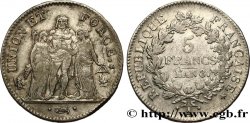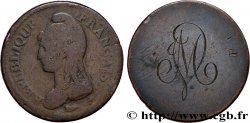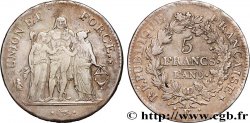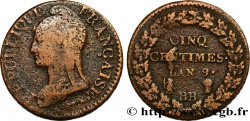fme_962671 - CONSULATE Médaille de reconnaissance au premier consul
120.00 €(Approx. 123.60$ | 99.60£)
Quantity
Add to your cart

Type : Médaille de reconnaissance au premier consul
Date: 1803
Mint name / Town : 59 - Lille
Metal : bronze
Diameter : 49,5 mm
Orientation dies : 12 h.
Engraver H. AUGUSTE
Weight : 68,94 g.
Edge : lisse
Puncheon : sans poinçon
Coments on the condition:
Jolie patine marron hétérogène malgré quelques taches noires d’oxydation. Présence de quelques coups et rayures. Restes de brillant de frappe
Catalogue references :
Obverse
Obverse legend : BONAPARTE PREMIER CONSUL DE LA RÉPUBLIQUE FRANÇAISE.
Obverse description : Buste de Napoléon Bonaparte à gauche ; légende autour.
Reverse
Reverse legend : LA VILLE DE LILLE AU PREMIER CONSUL // AMOUR, / FIDÉLITÉ, / RECONNOISSANCE // ARRÊTÉ DU CONSEIL / MUNICIPAL DU XIX / GEMRINAL AN XI / 9 AVRIL 1803.
Reverse description : Légende en huit ligne, l’une courbe, trois horizontales et quatre à l’exergue.
Commentary
Créée le 2 mai 1483, la « confrérie des canonniers et couleuvriniers » de Lille est alors appelée confrérie de sainte Barbe. Elle participe dès lors à la défense de la ville avec les armes de l'artillerie. Ainsi, lorsque Louis XIV fait le siège de la ville, les Canonniers le combattent. Pour récompenser leur courage, et leur habileté, Louis XIV leur garantit le maintien de leurs privilèges, et leur octroie deux canons d'honneur.
En 1708, les canonniers participent, aux côtés des troupes françaises, à la défense de la ville lors du siège de 1708. Le Canonnier maitre charron Jacques Boutry s'illustre par son ingéniosité pour réparer la porte d'eau, charnière de la défense lilloise. Il est récompensé par le maréchal de Boufflers qui l'anoblit.
Le siège de 1792, est le fait d'armes plus marquant de l'histoire des Canonniers. La confrérie de Sainte-Barbe a été dissoute, mais les confrères se sont tous engagés volontaires et servent dans le même bataillon "Égalité". La résistance des Lillois est héroïque. Les Canonniers n'ont pas quitté les remparts de tout le siège, y compris le capitaine Charlemagne Ovigneur qui apprend que sa maison et ses ateliers brûlent, et que sa femme accouche la même nuit.
Napoléon Bonaparte rend hommage à cette résistance et c'est en tant que consul qu'il reforme un bataillon distinct de la garde nationale le 31 août 1803, le bataillon des canonniers sédentaires de Lille. Il leur offre deux canons Gribeauval, présentés au musée des canonniers, l'Hôtel qu'ils occupent toujours, et remet au capitaine Ovigneur, la Légion d'honneur..
En 1708, les canonniers participent, aux côtés des troupes françaises, à la défense de la ville lors du siège de 1708. Le Canonnier maitre charron Jacques Boutry s'illustre par son ingéniosité pour réparer la porte d'eau, charnière de la défense lilloise. Il est récompensé par le maréchal de Boufflers qui l'anoblit.
Le siège de 1792, est le fait d'armes plus marquant de l'histoire des Canonniers. La confrérie de Sainte-Barbe a été dissoute, mais les confrères se sont tous engagés volontaires et servent dans le même bataillon "Égalité". La résistance des Lillois est héroïque. Les Canonniers n'ont pas quitté les remparts de tout le siège, y compris le capitaine Charlemagne Ovigneur qui apprend que sa maison et ses ateliers brûlent, et que sa femme accouche la même nuit.
Napoléon Bonaparte rend hommage à cette résistance et c'est en tant que consul qu'il reforme un bataillon distinct de la garde nationale le 31 août 1803, le bataillon des canonniers sédentaires de Lille. Il leur offre deux canons Gribeauval, présentés au musée des canonniers, l'Hôtel qu'ils occupent toujours, et remet au capitaine Ovigneur, la Légion d'honneur..








 Report a mistake
Report a mistake Print the page
Print the page Share my selection
Share my selection Ask a question
Ask a question Consign / sell
Consign / sell
 Full data
Full data









